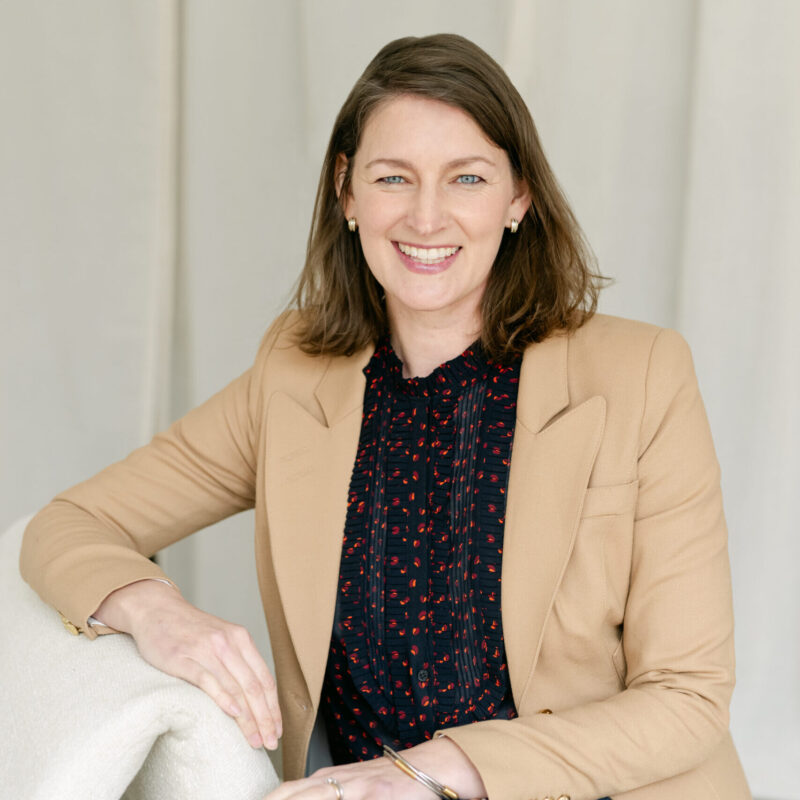Jane Baldwin
Head, Agrifood Systems, Mastercard Foundation
Bachelor of Science (Honours), 2006
One of the most valuable things I learned from King's is how to question assumptions. Within the structure of the lecture plus tutorial, a critical eye is encouraged. That genuine spirit of inquiry has served me well.
When Jane Baldwin, BSc(Hons)’06, reflects on her King’s experience, particularly the Foundation Year Program, she thinks it would be fun to do it all over again.
“Where I am in this place in my life, I feel like I would read a lot of texts with a different lens. Passages would resonate differently,” she says, referencing Hobbes’ Leviathan in particular. “It started off with all these definitions. I remember thinking, of course I know what all these terms mean. I’m 18, I know everything! And now, because I work in an international setting, I have a much deeper appreciation of how words can have vastly different meanings depending on context, experience and bias.”
Jane lives with her partner and two daughters in the East End of Toronto—home base for her work with the Mastercard Foundation.
Tell me about your role with the Mastercard Foundation.
The Mastercard Foundation is a registered Canadian charity and one of the largest Foundations in the world. We work with visionary organizations to advance education and financial inclusion to enable young people in Africa and Indigenous youth in Canada to access dignified and fulfilling work.
My role is the Head of Agrifood Systems for our Pan-African programs. Since attending King’s, the focus of my work has been designing and implementing large-scale youth employment and entrepreneurship programs.
I’ve been at the Foundation for almost 11 years. Currently, I oversee a program portfolio of half a billion dollars of funding—that’s funding going towards the implementation of programs across East, West and Southern Africa.
What do you mean when you talk about “dignified and fulfilling work?”
Not all work is equal. Some work is subsistence oriented. Some work is precarious. Some work could put you in a vulnerable situation. So, for the Foundation, dignified and fulfilling work is a very specific construct. It was co-created together with the young people we work with to define what dignified and fulfilling work means for them. It includes four markers: reliable income, reputable work, respect in the workplace, and sense of purpose.
And your focus is Africa?
The focus of my role is within Africa. My work contributes towards the Foundation’s Young Africa Works strategy, which aims to enable 30 million young people to access dignified and fulfilling work by 2030. We have offices in Ghana, Nigeria, Senegal, Ethiopia, Kenya, Uganda and Rwanda, as well as here in Toronto.
We also have a program which focuses on transforming education and employment systems to support Indigenous youth in Canada to access post-secondary education and transition to work aligned with their traditions, values and aspirations.
Can you expand on your role?
My role is really about working together with partners to design and implement workforce development and entrepreneurship programs that enable young people. A big part of my role is to critically assess programs and question assumptions around best practices. These are skills I learned at King’s. I look at trends, opportunities and economic growth sectors—where there is emerging demand for products or services and then identify and work with partners to co-design programs that help young people access those opportunities. My specific area of focus is within the African Agrifood systems.
What do you get out of your job?
Over the years, I’ve had the opportunity to work on both programs and operations in a number of different roles, which has been incredibly rewarding.
I’ve had the chance to work on strategy development, planning processes and rolling out enterprise-wide technology initiatives. I’ve also worked on designing and bringing forward technical programs that are co-designed with young people to have a lasting impact on their lives.
It’s inspiring when you go visit the programs and see your contributions in action. I’m just a small part of the overarching ecosystem, but it’s extremely motivating.
I have also had a tremendous opportunity to learn from participants, partner organizations and the broader community. The Foundation is constantly evolving; it’s a true learning organization. It’s very dynamic. My colleagues are fantastic, very thoughtful and intellectual—there’s been so much opportunity to grow and learn.
One of the most valuable things I learned from King’s is how to question assumptions. Within the structure of the lecture plus tutorial, a critical eye is encouraged. That genuine spirit of inquiry has served me well.
